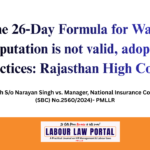The Delhi High Court’s judgment in X vs. Akademi is more than a procedural correction—it is a judicial reaffirmation of the PoSH Act’s core principles: fairness, independence, and protection from retaliation. By drawing a clear line between IC and LC jurisdiction, the Court has fortified the architecture of workplace justice.
In a landmark ruling that redefines procedural boundaries under India’s sexual harassment law, the Delhi High Court on August 28, 2025, held that Internal Committees (ICs) lack jurisdiction to inquire into complaints of sexual harassment against the “employer” as defined under the Sexual Harassment of Women at Workplace (Prevention, Prohibition and Redressal) Act, 2013 (PoSH Act).
The judgment, delivered in X vs. Akademi and Ors. (CM APPL. 47022/2023), has significant implications for government-financed institutions, private organizations, and the broader compliance ecosystem surrounding workplace harassment redressal.
The Case: A Probationer’s Plea for Justice
The petitioner, a probationary employee at a government-funded cultural institution, filed a complaint of sexual harassment against the Secretary of the establishment, who also served as its administrative head. The complaint was submitted to the institution’s Internal Committee (IC), which initiated an inquiry.
However, during the pendency of the inquiry, the petitioner’s services were terminated, prompting her to challenge the action before the Delhi High Court. She alleged that the termination was mala fide, retaliatory, and violative of the principles of natural justice, especially given the unresolved status of her harassment complaint.
Key Judicial Findings
The Court’s ruling centered on the interpretation of the term “employer” under Section 2(g) of the PoSH Act. It held that:
- The Secretary, being the administrative head of a government-financed institution, falls squarely within the definition of “employer.”
- As per Section 6(1) of the PoSH Act, complaints against the employer must be referred to the Local Committee (LC) constituted by the District Officer—not the Internal Committee of the establishment.
- The IC’s inquiry into the complaint was therefore without jurisdiction and lacked legal basis.
- The termination of the petitioner’s services during the pendency of the complaint was vitiated by mala fides and violated principles of natural justice, as it undermined the integrity of the redressal process.
Why Jurisdiction Matters Under PoSH
The PoSH Act establishes a dual redressal mechanism:
Complaint Target | Appropriate Forum |
Against co-worker, subordinate, or peer | Internal Committee (IC) |
Against employer or senior-most authority | Local Committee (LC) |
This bifurcation is designed to ensure impartiality and independence in cases where the alleged harasser holds administrative control over the IC or the institution itself. Allowing the IC to investigate its own superior would compromise the fairness and credibility of the inquiry.
The Delhi High Court’s ruling reinforces this structural safeguard, ensuring that power asymmetries do not erode justice in workplace harassment cases.
Expert Commentary: A Wake-Up Call for Institutions
Legal experts and HR compliance professionals have welcomed the judgment as a clarifying precedent. “This ruling plugs a critical gap in PoSH implementation,” said Advocate Renu Sharma, a workplace rights specialist. “Many institutions, especially in the government and quasi-government sectors, have been misrouting complaints against senior officials to their ICs, which is procedurally flawed.”
She added, “The judgment also sends a strong message against retaliatory termination, especially when a complaint is pending. It upholds the complainant’s right to a fair and fearless inquiry.”
Implications for Employers and ICs
The ruling necessitates immediate action from organizations to review and revise their PoSH protocols, particularly in cases involving senior leadership. Key takeaways include:
- ICs must decline jurisdiction over complaints against the employer and guide the complainant to the Local Committee.
- HR and legal teams must be trained to identify jurisdictional boundaries under the PoSH Act.
- Termination or adverse action against complainants during inquiry must be avoided to prevent allegations of victimization or mala fides.
- Institutions must maintain clear documentation of complaint routing and inquiry procedures to withstand judicial scrutiny.
Legal Precedents and Statutory Interpretation
The judgment builds on the statutory framework of the PoSH Act, particularly:
- Section 2(g): Defines “employer” as the person responsible for management, supervision, and control of the workplace.
- Section 6(1): Mandates that complaints against the employer be referred to the Local Committee.
- Section 9 and 11: Outline the inquiry process and powers of the IC and LC respectively.
While previous High Court rulings have touched upon procedural lapses in PoSH inquiries, X vs. Akademi is among the few to explicitly delineate jurisdictional boundaries and invalidate an IC-led inquiry on that basis.
Voices from the Ground
Women’s rights organizations and workplace advocacy groups have praised the judgment for reinforcing institutional accountability. “This ruling empowers complainants to demand proper routing of their grievances,” said Kavita Rao, Director of the Workplace Dignity Network. “It also warns institutions against using probationary status or administrative discretion to silence voices.”
The petitioner’s legal team expressed satisfaction with the outcome, noting that the judgment not only vindicated her complaint but also set a precedent for future cases involving power dynamics and procedural fairness.
What Comes Next?
The Delhi High Court has directed the institution to reinstate the petitioner and refer the complaint to the appropriate Local Committee for inquiry. The judgment is expected to trigger:
- Policy revisions across government-financed institutions
- Training modules for IC members and HR personnel
- Increased oversight by District Officers in PoSH implementation
Legal observers anticipate that the ruling will be cited in future cases involving jurisdictional challenges, especially in complex organizational hierarchies.
Conclusion: A Judicial Reaffirmation of Fair Process
The Delhi High Court’s judgment in X vs. Akademi is more than a procedural correction—it is a judicial reaffirmation of the PoSH Act’s core principles: fairness, independence, and protection from retaliation. By drawing a clear line between IC and LC jurisdiction, the Court has fortified the architecture of workplace justice.
As institutions recalibrate their compliance frameworks, the message is clear: redressal must be lawful, impartial, and fearless—especially when power is involved. For further insights into the evolving workplace paradigm, visit
 B-20, West Patel Nagar, New Delhi-18 (India) | 011-39330001 |
B-20, West Patel Nagar, New Delhi-18 (India) | 011-39330001 |  +91-762-691-24-36 | Email: info@peoplemanager.co.in
+91-762-691-24-36 | Email: info@peoplemanager.co.in



